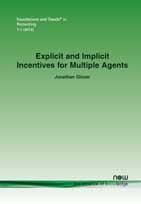Explicit and Implicit Incentives for Multiple Agents
By Jonathan Glover, Tepper School of Business, Carnegie Mellon University, USA, jglover@andrew.cmu.edu
Abstract
This monograph presents existing and new research on three approaches to multiagent incentives. The goal of all three approaches is to find theories that better explain observed institutions than the standard approach has.
Explicit and Implicit Incentives for Multiple Agents
Explicit and Implicit Incentives for Multiple Agents presents research on three themes related to multiagent incentives, taking the view that developing a better understanding of multiagent incentives is central to developing a better understanding of observed institutions. First, in preventing tacit collusion, confession is an alternative to ratting that allows for less demanding behavioral assumptions than Bayes-Nash, while approximately implementing the second-best (Bayes-Nash) solution. Second, optimal robust contracts designed to deal with a variety of settings are qualitatively similar to the standard optimal contracts when the variety is small and qualitatively different than the standard ones when the variety is large. When the variety is large, individual rather than relative performance evaluation is optimal in moral hazard settings, and procurement contracts similar to observed second-price procurement auctions emerge as optimal in adverse selection. Such contracts are not subject to the tacit collusion problem by virtue of providing dominant strategy incentives. Third, in repeated settings, collusion can be turned into cooperation (implicit contracting between the agents that benefits the principal) by using aggregate performance measures to motivate the agents to mutually monitor each other. The monograph surveys existing research on these three themes and presents new results. The focus of the monograph is on managerial accounting applications. The conclusion presents preliminary applications of the ideas to financial reporting regulation.
